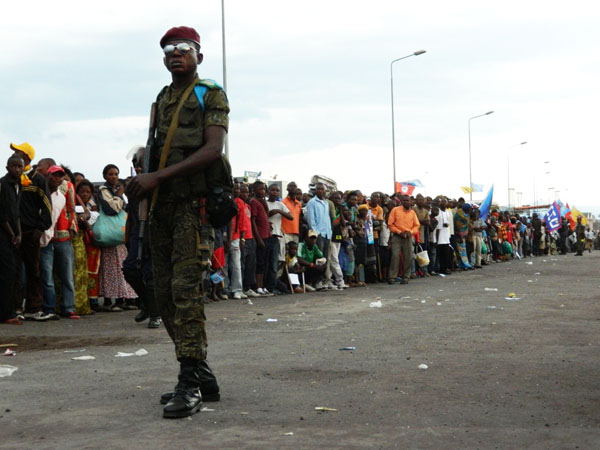
Editor’s Note: The international affairs magazine Global Brief recently asked two professors and Enough Project Executive Director John C. Bradshaw to envision the Democratic Republic of Congo seven years from now, in 2020. Bradshaw’s response, posted below, appears alongside the perspectives of Professor Calestous Juma from Harvard University's John F. Kennedy School of Government and professor Gwendolyn Mikell from Georgetown University.
In 2020, the DRC …will still have many major problems that are not fully resolved or fixed. However, with the right mix of initiatives that address fundamental economic and governance issues, positive scenarios are possible. If led by responsible Congolese reformers in both government and civil society, and creatively supported by regional and international actors, the DRC could, by 2020, be in the midst of a hopeful transition period.
A key turning point could come this year if a broad and comprehensive peace process to address the root causes of crisis in eastern Congo replaces the kind of stop-gap power-sharing arrangements that have perpetuated cycles of conflict in the region since the early 1990s. As this process moves beyond a focus on
short-term security and stability, a comprehensive regional peace agreement could take shape and be finalized by 2014. A successful peace process would be based on shared economic development and investment for regional stakeholders – including infrastructure development and legitimate, conflict-free resource extraction. It would be far more inclusive than past regional processes – creating an intra-Congolese dialogue to address
long-standing flash points like decentralization, protection of minorities, land tenure, refugees and electoral reform.
Under the regional peace accord, full-scale conflict in eastern Congo will come to an end by 2020, regional politics will be demilitarized, and the international community, led by the UN, will carry out a reform and reconstruction initiative. That initiative will assist in the building of institutions in the east, and cement a political framework that provides more autonomy to local lawmakers and leaders. After 2020, the plan is for that political framework to be codified into law in Kinshasa, and used as a model for democratic transformation and institution building throughout the country.
In the east, under this scenario, dividends from the past six years of peace in North and South Kivu provinces are taking shape as infrastructure development, justice sector reform, and security sector reform are becoming institutionalized in the provincial capitals of Goma and Bukavu. Significant progress in livelihood development and economic diversification will also be apparent in the eastern provinces. This will take place under a framework for regional economic integration in the extraction and processing of minerals, oil, gas, timber and other natural resources – a framework also created by the 2014 comprehensive regional peace accord. The centrepiece of this regional economic integration model will be a legitimate, conflict-free mineral supply chain that links eastern Congo’s vast mineral wealth with processing, transport and export businesses in neighbouring countries and throughout the region. Yet, despite all of this progress in the minerals sector, smuggling continues – especially in gold – and efforts continue to completely stamp out armed groups funding themselves through conflict minerals. Mines across eastern Congo are now becoming industrialized, which is an improvement on illegal exploitation – although it has, to be sure, promoted some corruption.
While this is an admittedly optimistic scenario that faces numerous obstacles to becoming reality, it is premissed on initiatives that are already underway, and is born of a recognition that both Congolese and international actors are eager to break the cycle of violence that has so long plagued a country so rich in potential.”
Visit Global Brief for the full piece.
Photo: Congolese Presidential Guard soldier in eastern Congo patrols a crowded parade route (Enough / Fidel Bafilemba)

